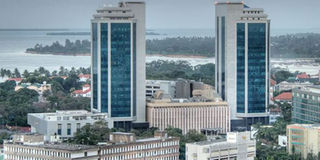How Bank of Tanzania was conned out of Sh680 million

The Bank of Tanzania headquarters. PHOTO | FILE
What you need to know:
- The High Court declares that a transaction made in 2017 was fraudulent, and orders that the $300,000 involved be returned to the central bank with interest
Dar es Salaam. It started on November 17, 2017 when the Bank of Tanzania (BoT) received a letter, purportedly from the ministry of Agriculture, instructing it to transfer $298,500 (Sh680 million at current exchange rates) to Rich Host Enterprises Group Limited’s account held with the National Merchants Bank, China.
The letter instructed BoT to transfer the sum from the agricultural ministry’s Expanding Rice Production Project (ERPP) account to Rich Host Enterprises Group Limited maintained by the China Merchants Bank.
Those who wanted the money took advantage of the fact that the ministry of agriculture had at that time opened and operated the ERPP account. ERPP aimed at increasing rice produced and marketed in targeted areas of Morogoro Region and on Zanzibar.
The letter indicated that the purpose of the transfer was to facilitate purchase of the rice equipment in implementation of the ERPP.
Believing the letter was genuine, after purportedly being signed by two signatories of the ministry---Mr Nkuvililwa Simkanga and Straton Ndakidemi, BoT transferred the money to its account held by JP Morgan Chase Bank of New York, US on December 7, 2017.
The New York bank was to transfer the fund to Rich Host Enterprises Group Limited’s account held with the National Merchants Bank, Tower Branch, China.
But what would later land in court emerged on January 23, 2018 when the agriculture ministry disowned the transaction because it has been wrongly debited from its ERPP account and demanded reversal of the transaction.
The BoT recently won reprieve after the commercial division of the High Court declared the transaction null and void, and based on fraudulent instruction order.
The court has also ordered China Merchants Bank to transfer the money from Rich Host’s account to BoT’s account held with JP Morgan Chase Bank.
With the court decision, Rich Host will also have to pay a 12 percent interest on the amount from December 7, 2017 when the money was transferred to the date of reversal of the fund to BoT’s account.
“Although no defence has been mounted, but thorough reading of the annextures, there is no dispute that there was transaction albeit fraudulent carried out. I am strongly convinced that the plaintiff (BoT) has proved her case and accordingly default judgment is entered against the defendants,” said Lady Justice Patricia Fikirini in her recent decision.
BoT brought a case in 2019 against Rich Host Enterprises Group Limited and China Merchants Bank in which it sought reversal of the transaction for being fraudulent.
The central bank also sought a declaration that a letter from the agriculture ministry that instructed it to transfer the money was based on forged documents.
The bank wanted the court to issue an order directing China Merchants Bank to debit the money from Rich Host’s account held with China Merchants Bank and thereafter credit the fund to its account held with JP Morgan Chase Bank.
When the case was called on August 29, 2019 lawyers who were representing BoT informed that court that their efforts to inform the respondents of the case through ordinary ways had proved futile.
The two could not appear in court even after a notice for them to appear in court was published in China Daily of June 29, 2020. The case then proceeded one sided.
“Failure by the defendants who were duly served to appear and counter the evidence without giving any explanation made this court to draw an adverse inference on them.
“The Ministry of Agriculture denied to have instructed such payment, the assertion which I had no reason to disbelieve, in the absence of any evidence to the contrary,” said the judge.
The court said the fact that there was no proof of any commercial relationship between BoT and Rich Host Enterprises Group Limited, and no claim was raised by the company to the Chinese bank in relation to the money which had been credited to their account made the transaction even questionable.




